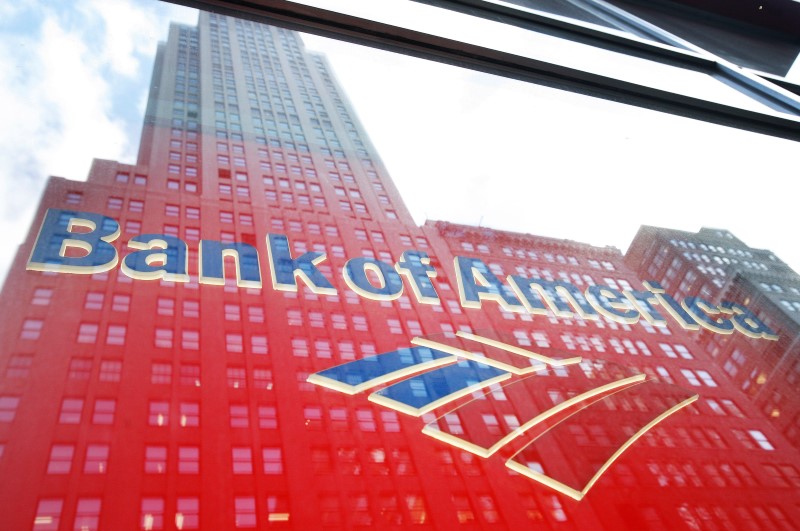Investing.com -- Bank of America (NYSE:BAC) leads a parade of more financial earnings, after JPMorgan (NYSE:JPM) stood out among a mediocre set of results from Wall Street on Tuesday. Drug wholesalers are in talks to settle opioid-related claims for $18 billion, while the hoped-for Brexit deal has hit a roadblock. Here's what you need to know in financial markets on Wednesday, 16th October
1. BofA tops the earnings bill
Earnings season continues with reports from Bank of America (NYSE:BAC) and some of the larger second-tier banks (US Bancorp (NYSE:USB), PNC Financial (NYSE:PNC), Bank of New York Mellon (NYSE:BK)) that are purer plays on the U.S. economy than their Wall Street brethren. The blue bloods reported a mixed bag on Tuesday, with only JPMorgan (NYSE:JPM) really distinguishing itself.
Abbott Labs (NYSE:ABT) will also report before the bell and has a tougher act to follow after UnitedHealth (NYSE:UNH) and J&J both posted strong numbers.
After the bell, it will be the turn of Netflix (NASDAQ:NFLX) and IBM (NYSE:IBM), while CSX (NASDAQ:CSX) and Kinder Morgan (NYSE:KMI) will update at a time when the market for their main commodity, crude oil, is taking a serious turn south.
2. Giant opioid settlement looms
Three of the biggest drug distributors at the heart of the opioid scandal - McKesson (NYSE:MCK), AmerisourceBergen (NYSE:ABC) and Cardinal Health (NYSE:CAH) – are in talks to settle the various allegations against them for a total of around $18 billion, according to The Wall Street Journal.
The WSJ said the payments would be phased over 18 years. It added that Johnson & Johnson would also chip in with some additional funds after its landmark settlements last month.
If finalized, the settlement would be the first to achieve a broad resolution of the opioid lawsuits outside of bankruptcy. OxyContin maker Purdue Pharma filed for bankruptcy in its attempts to effect a settlement of between $10 and $12 billion.
3. Stocks to open lower ahead of key retail sales data:
U.S. stocks are set to open lower amid lingering doubts about the substance of the U.S.’s much-hyped “phase-1” deal to de-escalate the trade dispute with China, and reports of a sudden “roadblock” on the path to a Brexit deal (see below) between the EU and U.K. The market has the chance of a morale boost at 8:30 with the publication of retail sales data for September. Core retail sales are expected to have risen 0.2% after stagnating in August.
By 6 AM ET (1000 GMT), Dow futures were down 61 points or 0.2%, the S&P 500 futures and Nasdaq futures were down by a similar amount.
United Airlines should be due a pop after beating earnings forecasts and raising its full-year outlook by just over 4% when it reported after the bell on Tuesday. Tradeweb Markets, which IPOed earlier this year, also beat consensus but still slipped a little in after-hours trading.
4. Brexit deal hits stumbling block
The British pound and stock market vacillated as negotiators closed in on a deal to avert a disorderly Brexit on Oct. 31.
Sterling fell over half a percent against both the dollar and euro on Wednesday morning on growing signs that Prime Minister Boris Johnson will struggle to win support for his proposals from Euroskeptic backbenchers and the Northern Irish Democratic Unionist Party. Johnson needs both of those factions onboard to get a majority in Westminster for his deal.
The FTSE 250, which is more U.K.-focused than the benchmark FTSE 100 index, was the worst performing market in Europe by 6 AM, losing 1%.
5. Oil inventories due
U.S. crude oil inventories are expected to have continued a streak of (mainly seasonally-dictated) increases last week. The American Petroleum Institute will release its weekly report on oil stocks at 4:30 PM ET, a day later than usual due to the Columbus Day holiday. The government will likewise put out its weekly report on domestic oil supplies on Thursday. Analysts expect a build of 2.77 million barrels in crude stocks after a rise of 2.91 million barrels last week.
Crude prices have slumped in recent sessions amid fears for global demand. The International Monetary Fund on Tuesday cut its gross domestic product forecast for the world economy to 3% this year, the weakest since 2009, and to 3.4% next year. By 6 AM ET, U.S. crude futures were up 0.3% at $52.98 a barrel, while Brent was up 0.1% at $58.84.
